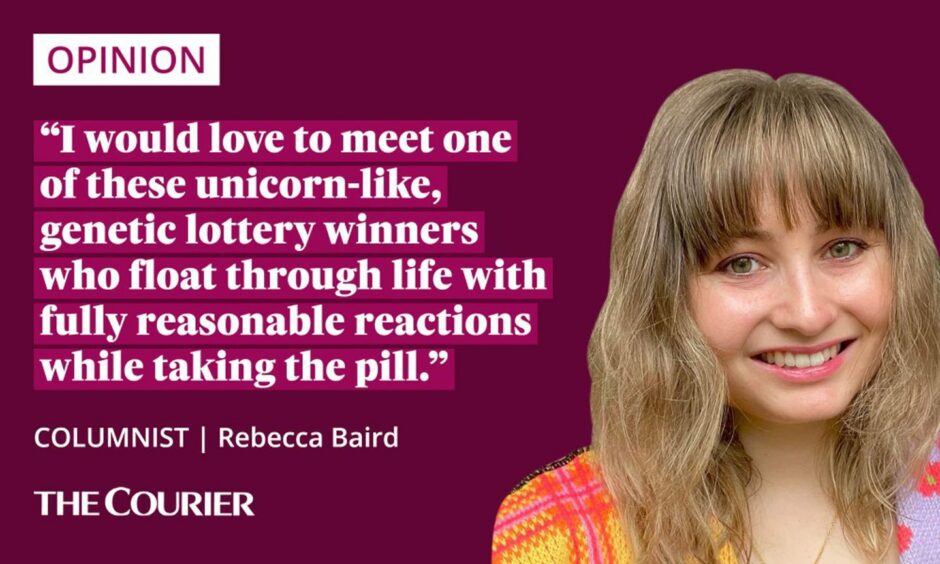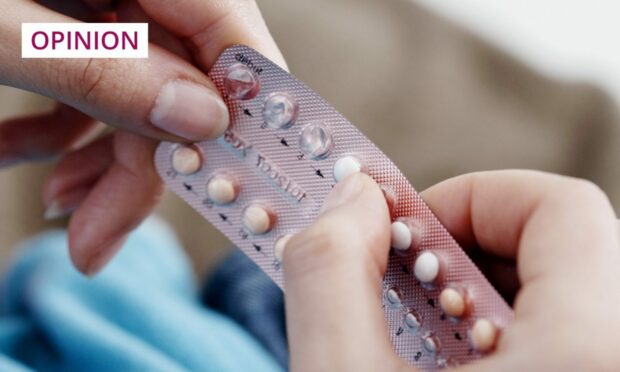“It’s like…like…” I wave my hands around, grasping the air to try and pluck the words out of it.
This is a problem I’ve had recently – I can never find the words anymore. Which is worrying for a writer.
Finally my fingers close on some clumsy ones.
“It’s like if you fall and break your leg, and then someone asks you to go a walk. And you say ‘my leg is broken’ and they say, ‘well that’s only because you fell’.
“Like, yeah – but I still can’t walk on it! You know?”
My partner eyes me with a mix of genuine pity and valiantly suppressed amusement. Bless him. I know I must make a mad sight.

We’re sitting in my baking hot car, parked on the Perth Road. We were supposed to be at the restaurant 10 minutes ago, but I had to sit in the car and hold back tears for God knows whatever reason. This happens all the time now.
My hair is frizzing from the heat and my face is red and I’m speaking at 100 miles a minute, gesticulating wildly, trying to find an adequate metaphor to answer the question: ‘What’s up with you lately?’
Pill and I are reluctant bedfellows
What’s up with me is after six years of resisting the emotional black hole of hormonal contraception which I fell into at 17 and climbed out of at 22, I’m back on the pill.
I’ll skip the boring details, this is just where I’m at for now. It’s where so many women are at.
And it’s hellish. The change in me was noticeable from week one.
#mypillstory women should be warned about all side effects before being prescribed the pill, no matter if it's for periods or contraception
— izzy (@isxbeIIe) April 5, 2016
Not only because of the list of cheeky wee side effects we’re ‘warned’ about: Weight gain. Weight loss. Acne. Hair loss. Blood clots. Heavier periods. Irregular periods. No periods. Headaches. Migraines. Nausea. Breast tenderness. Ovarian cysts. Increased sex drive. Decreased sex drive. Insomnia. Depression.
(Needless to say I’m not feeling my usual fun, fresh and flirty self.)
The pill side effect no one talks about
But the side effect no one talks about is that no one talks about how crap this is. Not seriously. Not beyond weary whispered gripes in the ladies’ loos, or the occasional self-deprecating sigh of: ‘Oh, must be hormonal!’
The doctors assure you that ‘some women have no side affects at all’ and while I’m very sure that’s true, I would love to meet one of these unicorn-like, genetic lottery winners who float through life with fully reasonable reactions while taking the pill.
Because studies have shown that a whopping 3.5 million of us in the UK have been dealing with “unnecessary effects, symptoms and repercussions” from being on a pill not suited to our unique bodies.
And a new report from Cambridge states that women who start taking the pill are more likely to experience depression for the first two years, compared to those who don’t take it.
For me, it’s already been a few months of white-knuckling through relentless, rampant emotional instability, and I’m still waiting for that magical day where it ‘settles’.
Yet when I worry aloud about my daily headaches, my unstoppable, hours-long crying sessions, my inability to remember to take the bins out three days in a row or think straight at work, my weirdly heightened sense of smell or the terrifying emptiness and lack of joy that’s descended on me since I started taking these pills, every woman I speak to says the same thing:
‘Oh I was the same, you get used to it. You just need to remember it’s not you, it’s the pill.’
Stop side-lining your pill side effects
Not ‘it gets better’ or ‘it stops’. Simply that I will become accustomed to the gremlin which has taken over my brain, eaten all my hope for the day before I even wake up, and holds my personality hostage to my artificial hormones.
I’m sorry, but I don’t accept that. Just because the cause of pain is artificial doesn’t make the pain itself any less real.
Suicidal. Incessant relentless panic attacks. Fatigue. Constant crying. Headaches. No interest in anything. #mypillstory
— Challis Zillwood (@challiszillwood) March 31, 2016
To tie up the best metaphor my chemically flooded frontal cortex can muster, a broken leg doesn’t get better just because you know how you broke it.
‘Side effects’ need to stop being pushed aside, by doctors and among women ourselves.
They should be monitored, taken seriously, and the medication changed until the right balance is found. Which is why I’m going back to the doctor.
Because we all deserve to have contraception which isn’t simply ‘the best of a bad bunch’.
We deserve to feel OK.
Pride isn’t always a parade
As we approach the end of Pride month, I’ve been reflecting on debates around the nature of Pride.
Personally I find the flamboyance and flag-flying quite fun, but for me, it’s not what Pride is about.
For me, Pride is summed up by an interaction I had in a city coffee shop just the other day.
I was sitting alone, reading gay author Douglas Stuart’s newest release, Young Mungo. The cover depicts two men kissing. That in itself still feels radical.
A waitress, with hair dyed pink, purple and blue – the colours of the bisexual flag – asked me what I was reading. I showed her and her face lit up.
“I just finished Song of Achilles!” she said, referencing Madeleine Miller’s queer retelling of the Greek myth of Achilles and the battle of Troy.
“Oh, I read that two years ago,” I replied. “It was beautiful.”
Her friend chimed in: “I’m reading Young Mungo too. It’s great.”
We all smiled at one another, knowing that we weren’t just discussing books. We were each signalling, quietly amid the lunch rush: I see you, you’re safe.
As I left, the waitress waved from behind a cloud of steam: “Happy Pride!”
Happy Pride indeed.











